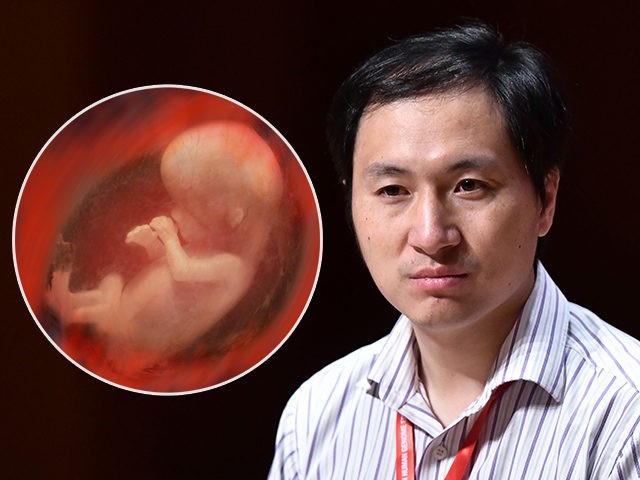Chinese state media announced Monday that a court in southern Shenzhen sentenced He Jiankui, a rogue biophysicist, to three years in prison for claims he illegally edited the genes of twins in utero.
The court fined He $430,000 and sentenced two others to prison as well for cooperating in the project. According to He, he used experimental gene-editing technology to remove inherited HIV from the genes of the babies, creating the first human beings born genetically altered.
When he made his announcement in November 2018, He claimed he had altered the genes of a third baby which had yet to be born. That child was due this summer, but the Chinese government has seized all information on the experiments and the status of that baby or the twins remains a secret. Chinese media did claim “three babies were born” from He’s experiment, confirming that the third baby made it to term.
China strictly regulates human reproduction, limiting couples to birthing two children in their lifetime. Parents who violate this rule face forced infanticide, forced abortion, or government sterilization. China expanded from its “one-child” policy in 2015 to stall an accelerating population collapse triggered by decades of state-mandated family planning, which had the unintended effect of prompting mass female infanticide and severely limiting the national population of child-bearing women.
In addition to He, two other scientists identified as Zhang Renli and Qin Jinzhou received “jail terms of two years and 18 months with a two-year reprieve, respectively, as well as fines,” according to China’s state-run Xinhua news agency.
The three were charged with “illegal medical practice,” a significantly more minor crime than speculation following He’s disappearance last year suggested. Some experts predicted that, in an attempt to deter other scientists from pursuing similar experiments modifying human genes without Communist Party supervision, He could have faced charges of corruption, which often result in life sentences or capital punishment.
Instead, the Global Times reported, “according to the verdict, the three, not qualified to work as doctors, had knowingly violated the country’s regulations and ethical principles to practice gene editing in assisted reproductive medicine.”
He was an associate professor at the Southern University of Science and Technology and holds a doctorate in biophysics. He studied at Stanford and Rice universities in the United States and first experimented with gene editing at Rice. He is not a medical doctor.
The court also found He guilty of forging documents to get past China’s close regulation of scientific experimentation, including using forged documents to convince reproductive doctors to implant the gene-edited embryos in their mothers. The latter suggests the doctors who completed this task are not facing criminal prosecution, as they acted, to the best of their knowledge, on orders approved by the Chinese government.
The judge presiding over the He case accused all three scientists of acting “in the pursuit of personal fame and gain” and having “disrupted medical order.”
The defendants plead guilty, likely in part because He had published a video announcement of his gene modification last year before his disappearance and presumed arrest.
In November 2018, He published a video online announcing that he had, according to him, successfully used Clustered Regularly Interspaced Short Palindromic Repeats (CRISPR), an experimental gene-editing tool, to disable the gene carrying HIV in the DNA of the twins he used in his experiment, essentially creating a gene mutation that makes the children, in theory, immune to HIV. He later confirmed he had conducted a similar experiment on an unborn child before disappearing in January.
Editing the gene of an unborn child using CRISPR results in a mutation they can pass down to their future children, effectively entering an untested genetic mutation into the human gene pool. Animals’ bodies engage in CRISPR gene-editing naturally, causing genetic mutations that theoretically push forward the process of natural selection.
As scientists have yet to confirm the safety of human-induced CRISPR, there is no guarantee that, in disabling the gene He targeted, he did not also disable other genes that serve other essential functions.
Following He’s presentation revealing the experiment in Hong Kong in November 2018 – the last time He was seen in public – the scientist received near-universal condemnation from his peers. The Chinese communist regime, which regularly traffics organs extracted from live political prisoners without anesthesia on the black market, called He’s attempt to eradicate HIV “shocking and unacceptable.”
“The gene-edited twins matter reported by the media has brazenly violated Chinese laws and regulations and breached the science ethics bottom line, which is both shocking and unacceptable,” Vice Minister of Science and Technology Xu Nanping said at the time.
The Chinese government has kept all information on the experiments secret, so no public information exists on the success of He’s experiment or the health of the children involved, essentially preventing other scientists from using the results of his experiment to improve upon his work. Beijing banned any future research in the area without government review shortly after the experiment. According to the Global Times, experiments on embryos in China are legal only if the scientist kills the child after 14 days, according to a 2003 regulation.

COMMENTS
Please let us know if you're having issues with commenting.